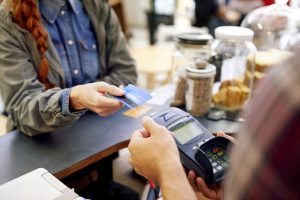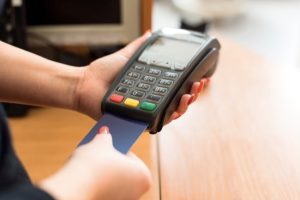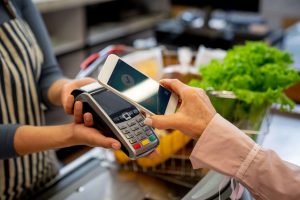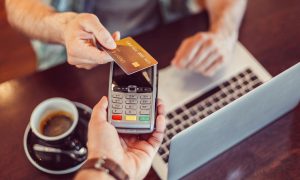2022 GUIDE TO IN-STORE CARDING USING CC DUMPS
What’s up? Today’s 2022 guide will address CC dumps and in-store carding.
Those of you who aren’t in our secret invite-only Telegram group, we’ve been very busy with orders and addressing queries, so we couldn’t bring you the latest instructions.
Before we begin, we’d want to explain the terminologies we’ll be using in this session.
1. DUMPS
Dumps are the information written on a credit/debit card’s magnetic stripe. It comes in
tracks 1 & 2. no address, city, state, no nothing. Just 2 lines of numbers/signs.
Track 1 shows the card holder’s name which makes it more useful. If it’s a unique name,
you can white-page it to find their zip which comes in handy.
If you don’t buy your CC dumps from us you may only end up getting Track 2.
But it’s not a bigger of a deal if you are smart and savvy who knows how to read the documentation and guides so that you can generate a valid working Track 1 from Track 2.
However; you’ll need both Track 1 + Track 2 to write a dump on a CC that can be used in both ways i.e. swipe and EMV where PIN is required considering that you’ll receive the valid PIN along with your dump (on our shop you get track 1 + track 2 + PIN).
Here’s an example of what you would get if you bought a dump that came with both
Track 1 & 2.
- TRACK 1: 4854240000439134 ^ SMITH/JOHN ^ 2307101000000000000000497000000
- TRACK 2: 4854240000439134=23071010497000000000
Again, if you’ll only get track 2 then you’ll need to make track 1.
Take this example of dump with only Track2:
- 4888603170607238=23051011203191805191
When you see and equal sign (=) in a Track it always means it is Track 2.
You first must take the Credit Card number from Track 2 (Everything before the
equals sign) in this example, it is;
- 4888603170607238
- Add the letter “B” in the front of the number like this:
- B4888603170607238
- Then add the cardholder name YOU want to show on the card / receipt
- B4888603170607238
- ^Smith/John^ (Last name first/First Name)
- Next add the expiration date and service code (expiration is YYMM in this case 2305, and in this case the 3 digit service code is 101 so add 1505101):
- B4888603170607238 ^ Smith/John ^ 2305101
- Now add 10 zero’s after service code:
- 230510100000000001203191805191
- And then add six zero’s (6) zero’s:
- 00000
Congrats! You have just made the Track 1 using Track 2.
This is your final version;
Track1: B4888603170607238^Smith/John^230510100000000001203191805191000000
2. PLASTIC
Plastic refers to the white cards that many plastic vendors make to match your dump, meaning they will emboss your dump’s numbers as well as the desired name you want onto a blank (not-embossed card).

You’d be surprised at the quality of plastics, most cashiers can’t differentiate a fake from a real one (unless you have really low quality plastic or the cashier is deep into this).
Plastics are not necessary because you can encode any old card, they are just a lot more legit.
This can also be a waste of money if you have dumps that die fast due to being obtained from a shady source.
3. 101/201 DUMPS
What is the difference between 101 and 201 dumps?
Well it’s very simple: 101 is swipe only and 201 is with chip.
Now you’re going to ask, how you are going to pass a 201 chipped card without knowing the pin?
Well there are places for that, especially POS machines that swipe 201’s (meaning they don’t insert them). You will have to find spots on your own or simply buy quality dumps that work from us.
Alright, now that you’ve learned the 3 different terms above we will use throughout the guide, here starts the interesting stuff.
There are a lot of ways to do instore carding but basically it comes out to this:
- Hitting it random.
- Insider carding.
1. HITTING IT RANDOM:
If you have an embosser, the sky is the limit. You can pretty much go anywhere because your card numbers match your track which is important because some POS systems have digit verification but more on that later on down below.

If you are re-encoding old cards and do not have matching last 4, then you have 2 options.
Option A) You can either buy it from us and tell us the last 4 digits that you need so that you will be able to give you the dump that you can use it with yours and use it on it own as well.
OR ELSE
Option B) You need to make sure the POS system at the store you want to hit does not ask for last 4 of the card. It’s trial and error.
Most places in the US do not have verification until you hit a certain dollar amount.
2. INSIDER CARDING:
This is the safest way to go. You will need a connection working inside a store who will let you pass cards. So matching plastic is not a must here and usually you can get away with a lot and not look suspicious at all.
we suggest you do this to get your funds up to buy machinery for random hitting (or affording strikers). POS Types and why you should read this. There are many POS systems and a lot of them are different one from each other. You will need to know the ones that are easy to swipe and the ones that are slightly harder.
Again, some POS systems will ask to enter the 4 last digits of the card number, so matching numbers is a must for these. GUIDE TO START IN-STORE CARDING
Even with an insider, he/she must enter the matching numbers or else payment won’t go through (you can write them on a piece of paper and let him enter those digits though).
For example, let’s use Best Buy’s POS system as our example. You cannot buy anything in Best Buy without the computer prompting for the last 4 digits. GUIDE TO START IN-STORE CARDING
Most stores are like this. When checking out with credit card, the computer will prompt for the cashier to enter the last 4 digits. The cashier will then ask to see the card and verify it. GUIDE TO START IN-STORE CARDING.

If you do not have the last 4 embossed and you’re in a store that requires last 4 verification, just make up an excuse, like;
“Oh, actually, I forgot I wanted to pay for this with cash.”
Pull out some cash, then say,
“Oh, I don’t have enough. Where’s the closest ATM?”
This will prevent the cashier from entering the last 4 and it saying
“DOES NOT MATCH.”
which could result in a shitstorm.
If you went ahead and presented the card “acting dumb” and have a young cashier, they will probably just say “Wow, weird, I have never seen that before.” and give the card back to you.
On the other hand If you have a seasoned wise cashier, they will call your bluff and try to take the card.
We have found that Walmart does not have any type of verification regardless of the price, its Walmart after all.
However, if your last 4 do not match they can still look at the receipt and call your bluff because it will show the actual encoded last 4.
This only happens if you look like extremely sketchy and they want to test you. Most will just hand you your receipt and say have a nice day.

It’s up to you to find which stores ask for last 4 and which do not.
Other POS’ will ask to enter the cvv2 (3 security digits on the back or 4 for Amex) before even swiping the card. Keep in mind that dumps bought on the internet don’t contain the cvv because it is encrypted in Track2 and very hard to decrypt (different algorithm for every bank).
So if you want cvv2 matching, you will need to skim the dumps and check yourself and note them. Usually big stores have this.
There also are POS systems that won’t let you insert 201 (chipped) cards. These POS’s are good to keep in your book because sometimes, the bins or country you want will be out of 101s and you’ll get stuck with 201s and you can hit them with these POS’s. So they swipe the chipped card, no inserting nor pin required.
A good example are the ones who have a black pad as a POS with a screen for signature capturing (they have an insert slot but they don’t use it).Q: How do you obtain dumps? Getting dumps isn’t really that hard as long as you are a seasoned cyber criminal. There are 3 ways to get dumps:
1. HACKING:
Pretty simple, you hack POS systems for dumps with either malware or logging system. This is for advanced hackers because you will have to code the malware and test it on a POS you will buy yourself. GUIDE TO START IN-STORE CARDING.
2. SKIMMING:
There is online and offline skimming. You can use pagers and mini- readers too. It would be wiser to invest a bit more and get d+p with an offline.
3. BUYING AT ALPHABANKLOGS:
There are many vendors that sell dumps online, but you will be better off going with a vendor like us who has the experience and means to get legitimate working dumps with Track 1 + Track 2 + PIN.
Bin Selection: Many people have fuzzy perceptions about BINs. Bins are the first 6 digits of any dump.
It represents the financial institution it is from as well as the location of this specific branch and the type of card the dump is if you are looking for a specific BIN for the dump simply let us know in the note while checking out and we will be more than happy to honor your request as we read all notes before filling your orders. Usually, people have binlists they personally craft (you should too) to find the best ones. Special bins and hard to find bins are sought after because they usually have special characteristics like these:
- They die slower, so when a base is almost dead, these are still approved.
- They are not region-locked.
- They have high limits.
Local bins are always the best ones!
After you have your dumps, you can encode them on anything with a stripe. Old visa gift cards are usually good. If something is to go down, you can ditch that card. Your name is not associated with it.
You will use an MSR encoder (reader/writer) to encode the tracks 1 & 2 (3 is never used
on a cc) on the card.
This is basically the only tool you need, not to mention that we also sell all EMV writing softwares and hardwares on a frequent basis therefore we know more than a thing or two about it all.Other equipment that are good investments are these:
Embosser + Tipper Set: Unfortunately we don’t sell those on our site at present due to them being so bulky, although this could be a worthwhile investment you can get these on amazon.
Non-embossed blank plastics cost $15 – $20 in bulk and embossed are up to $45 – $50 a piece if bought individually.
They are very easy to operate, don’t worry. Don’t need to be a genius to use them. Card Printer + Holos: This is for usually for people who have a big operation or want to sell blanks/embossed plastics, again, we don’t do these either due to them too bulky to ship.
We own all this machinery in our Utah office and it’s expensive (2.5K upwards if you want a decent professional one).
Pagers (mini123 etc…): These are good because if you know anyone who works in a fancy restaurant where they pass your card in the back, you can give him a pager that records up to 2000 dumps a lot of our 3rd party vendors at alphabanklogs.com obtain Dumps + PIN this way.
You may be thinking how to properly hit a store?
Well, hitting stores is pretty easy, but it’s a pain in the ass if you have just started or you’re
nervous or shy because you will have to act like you are the actual cardholder.
Don’t dress up like a thug or a kid, dress like you normally do and act normal.
***Always know what you are getting before entering, make out a scenario and plan it
wisely.Another important part is finding the stupidest or newest cashier. Some cashiers will look at your card and verify it and some even call the manager to come check it.So find the youngest/dumbest looking cashier or the most f***ed-up/stoner cashierbecause they usually are too naïve or don’t give a f**k. GUIDE TO START IN-STORE CARDING.
DECLINED/HOLD-CALL:
Don’t worry, plenty of people have it happen randomly to them.
DECLINE: It means something is wrong with the card, but not exactly stolen, so they don’t know what’s wrong with it but it’s declined.
Just tell them you’ll call the bank and walk away. No one will chase you. Your card is probably just dead. Go home, make a new one, and go on about your day.
HOLD-CALL: Now this is where it gets shakier, this means the cashier has to hold the card and call the bank.
What you can do is tell them you’ll call the bank later because you’re in a rush but keep the card. This means something is definitely wrong with your card.
So that’s it for today, if you are unsure about anything and would like to show you everything you can always buy our masterclass and we will be happy to spare time to teach you. GUIDE TO START IN-STORE CARDING.
Simple 2022 instruction to start in-store carding with CC dumps. If so, you can write to us with your thoughts and requests for more articles.
You can also buy instant Transfers:


Cashapp Money Transfer Click here
Paypal Money Transfer Click here
Western Union Money Transfer Click here
Venmo Money Transfer Click here
Bank Money Transfer Click here to Contact Us
